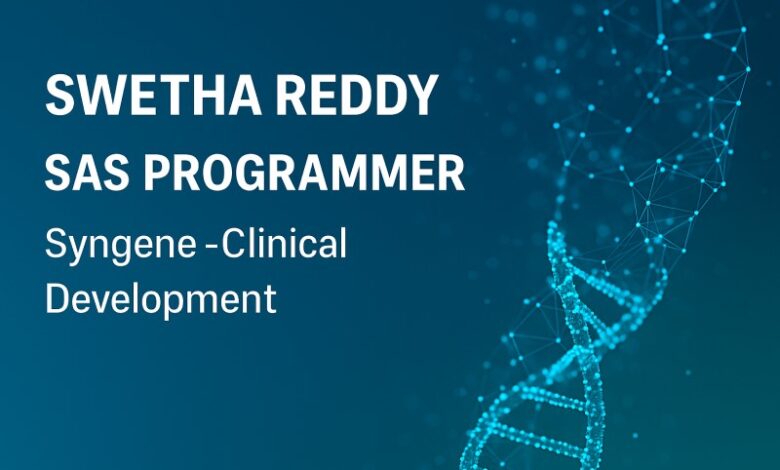Swetha Reddy: An Expert SAS Programmer Driving Clinical Development at Syngene International Limited

In the fast-paced world of clinical research and pharmaceutical development, professionals who combine technical expertise with a deep understanding of clinical data play a critical role in advancing healthcare innovations. One such professional is Swetha Reddy, a seasoned SAS Programmer at Syngene International Limited, a leading integrated research and development company.
Over the past decade, Swetha has made extensive contributions to clinical development projects, utilizing her skills in SAS programming to facilitate data analysis, reporting, and regulatory compliance. This article explores Swetha Reddy’s role, expertise, and the importance of clinical SAS programming at Syngene International Limited, highlighting the impact of her work on global drug development and patient care.
Who is Swetha Reddy?
Swetha Reddy is an accomplished SAS Programmer who has been with Syngene International Limited since February 2015, accumulating more than 10 years of hands-on experience. Based in the Bangaon area of India, she has played an integral role in the clinical development teams, focusing on data management, statistical programming, and ensuring the quality and integrity of clinical trial data.
Her responsibilities span multiple phases of clinical trials, where she works closely with biostatisticians, clinical data managers, and regulatory teams. Swetha’s expertise is rooted in her mastery of SAS — a powerful statistical software suite widely used in pharmaceutical research for data analysis, visualization, and the generation of submission-ready reports.
The Role of SAS Programming in Clinical Development
Before exploring Swetha’s contributions, it’s essential to understand the critical role SAS programming plays in clinical research. Clinical trials generate vast amounts of data, including patient demographics, laboratory results, adverse event reports, and efficacy outcomes. The management and analysis of this data must adhere strictly to regulatory guidelines such as those from the FDA, EMA, and ICH.
SAS programming is indispensable in this context for the following reasons:
- Data Cleaning and Validation: SAS programs ensure data accuracy by identifying inconsistencies and errors.
- Statistical Analysis: SAS facilitates the development of complex statistical models to evaluate the safety and efficacy of investigational drugs.
- Reporting: It enables the creation of tables, listings, and figures (TLFs) that summarize trial results for regulatory submissions.
- Compliance: The SAS code must align with regulatory standards to ensure reproducibility and transparency in clinical research.
SAS programmers, like Swetha, are therefore essential to bridging raw clinical data and meaningful, actionable insights that drive drug approvals.
Syngene International Limited: A Global Leader in Clinical Research
Swetha Reddy’s workplace, Syngene International Limited, is a pioneering contract research organization (CRO) based in Bengaluru, Karnataka, India. Founded in 1993, Syngene serves a diverse range of industries, including pharmaceutical, biotechnology, nutrition, animal health, consumer goods, and speciality chemicals.
The company employs over 6,000 scientists and has built a robust infrastructure that spans discovery research, development, manufacturing, and clinical development services. Syngene’s client portfolio includes global pharmaceutical giants like Amgen, Baxter, Bristol-Myers Squibb, GSK, Zoetis, and Merck KGaA, reflecting its reputation for scientific excellence and data security.
At Syngene, the clinical development team is a crucial pillar, responsible for managing the clinical trial lifecycle from protocol design through data analysis and submission. Swetha, as part of this team, helps ensure that clinical data is accurately processed and analyzed to support regulatory submissions and successful drug approvals worldwide.
Swetha Reddy’s Expertise in Clinical SAS Programming
With over a decade of experience, Swetha has honed an advanced skill set in SAS programming tailored to clinical trials. Her expertise includes:
- Data Management and Preparation: Transforming raw clinical trial data into structured formats suitable for analysis.
- Analysis Dataset Programming: Creating Analysis Data Model (ADaM) datasets aligned with clinical trial protocols.
- Production of Clinical Study Reports (CSRs): Developing statistical output (tables, listings, figures) for study reports.
- SDTM Mapping and Validation: Ensuring that clinical data conforms to the Study Data Tabulation Model (SDTM) standards mandated by regulatory authorities.
- Quality Control: Implementing rigorous code review and validation processes to ensure error-free outputs.
- Regulatory Submissions: Preparing data and reports for submissions to global regulatory agencies, ensuring compliance with their strict guidelines.
Swetha’s ability to work with multidisciplinary teams, including statisticians, medical writers, and regulatory experts, highlights her role as a key collaborator in clinical development projects.
Impact of Swetha Reddy’s Work on Drug Development
The ultimate goal of clinical trials is to bring safe and effective drugs to market, benefiting patients worldwide. The accuracy and reliability of clinical data underpin all decision-making processes in the development of drugs. Swetha’s role in programming and validating this data ensures:
- Integrity and Accuracy: Her SAS programming ensures clinical data integrity, reducing the risk of errors that could jeopardize trial outcomes.
- Efficiency: By automating data processing and report generation, she helps accelerate the clinical trial timelines.
- Regulatory Confidence: High-quality data outputs support regulatory review, facilitating the approval of drugs and other medical products.
- Innovation: Enabling data-driven insights that can influence trial design and therapeutic strategies.
Her contributions, while often behind the scenes, are vital to maintaining scientific rigour and regulatory compliance, which ultimately shape public health advancements.
Challenges in Clinical SAS Programming
SAS programmers like Swetha face unique challenges in clinical research:
- Complex Data Structures: Clinical data can be heterogeneous and voluminous, necessitating sophisticated coding to standardize and effectively analyze it.
- Regulatory Updates: Constantly evolving regulatory requirements demand programmers stay current with guidelines and industry best practices.
- Time Sensitivity: Clinical trials operate under strict deadlines; programmers must deliver accurate results promptly.
- Collaboration Across Functions: Coordinating with diverse teams across geography and expertise areas requires excellent communication skills.
Swetha’s long tenure at Syngene demonstrates her ability to navigate these challenges with professionalism and technical proficiency.
The Future of Clinical SAS Programming at Syngene
The clinical research industry is rapidly evolving with the integration of new technologies, including artificial intelligence (AI), machine learning, and big data analytics. While SAS remains a cornerstone tool, emerging trends are shaping the future of clinical data management and analysis.
At Syngene, programmers like Swetha will likely continue to:
- Adopt Advanced Analytics: Integrate AI-driven analytics for deeper insights.
- Enhance Data Integration: Work with diverse data sources, including real-world evidence and electronic health records.
- Implement Automation: Use automation to streamline routine programming tasks.
- Ensure Data Security: Maintain robust data privacy and security practices amid digital transformation.
Swetha’s experience and adaptability position her well to make meaningful contributions to Syngene’s evolving clinical development landscape.
Also Read: Diversified Agency Services, Omnicom’s Powerhouse Driving Global Marketing Excellence
Conclusion
Swetha Reddy exemplifies the critical role of SAS programmers in modern clinical research. Throughout her decade-long career at Syngene International Limited, she has made significant contributions to ensuring that clinical data is meticulously processed, analyzed, and presented in compliance with global regulatory standards. Her expertise in clinical SAS programming enables the timely development and approval of new therapies, ultimately improving patient outcomes worldwide.
As the clinical development field embraces new technological innovations, professionals like Swetha will remain at the forefront, driving data integrity and scientific excellence. For anyone interested in the intersection of programming and clinical research, Swetha’s career provides a compelling example of the impactful work done behind the scenes in advancing global health.



